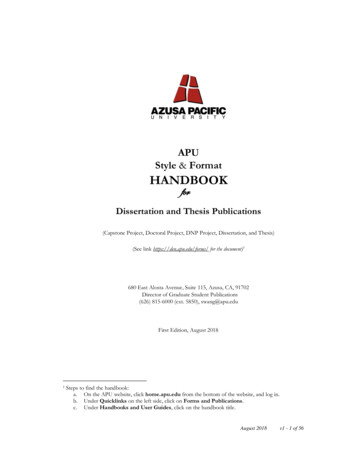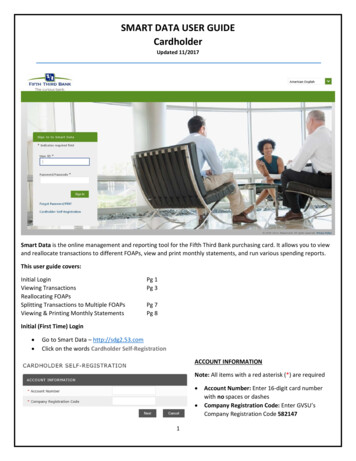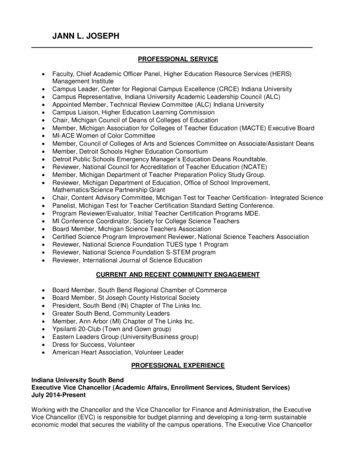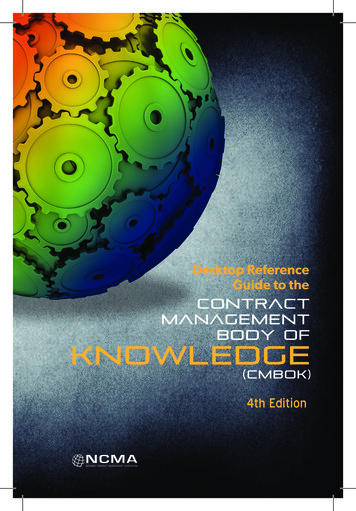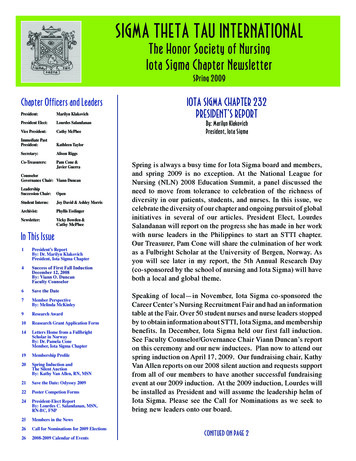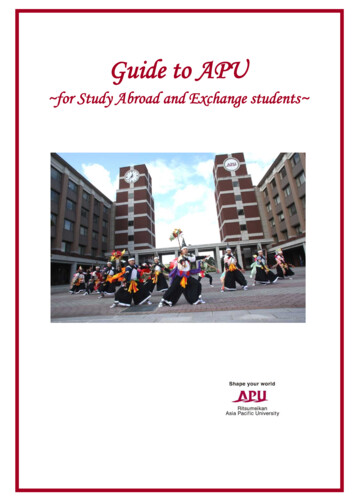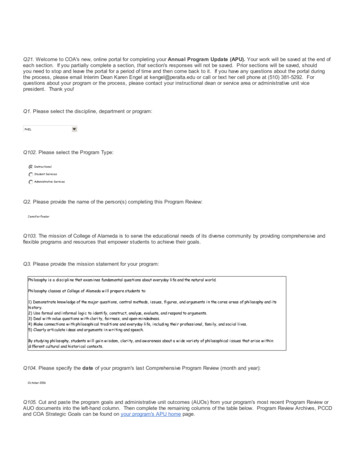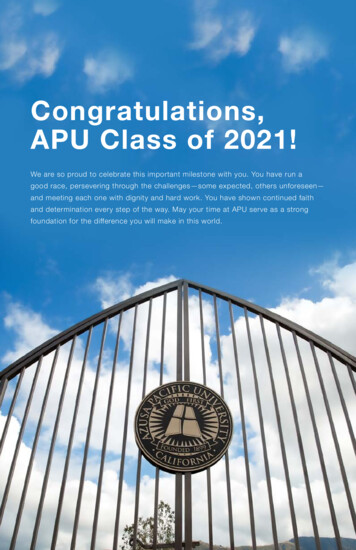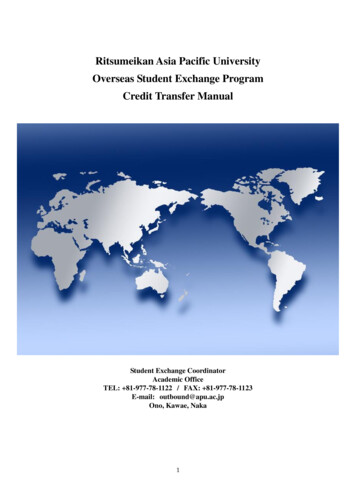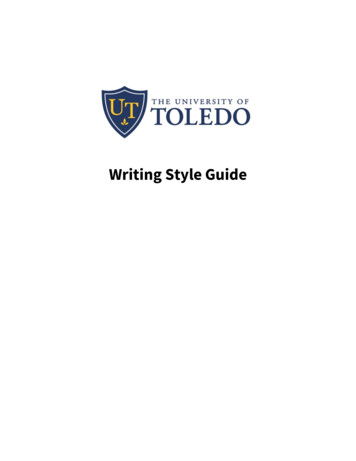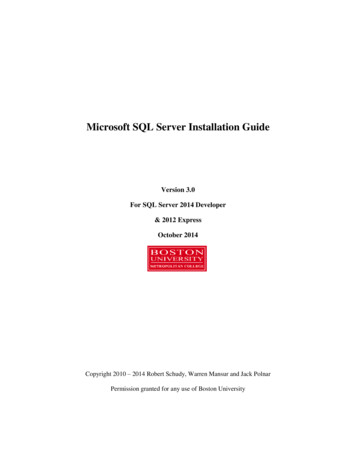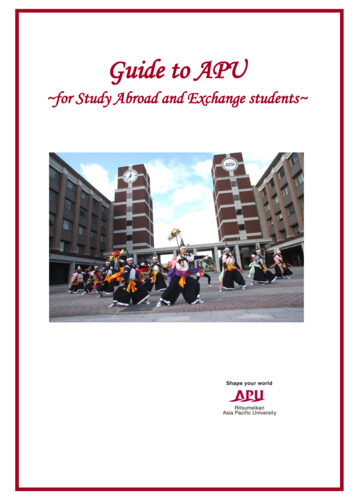
Transcription
Guide to APU for Study Abroad and Exchange students 1
A guide for incoming students1.Message from APU22.Getting to the APU Campus33.Preparation for Departure and Arrival at APU54.Housing75.Studies at APU96.Life at APU and Beppu147.Health and Insurance178.Culture Shock189.Warning: Criminal Behavior and Drugs1910. Tips from Past Exchange Students11. Helpful Websites21231
1. Message from APUこんにちは! Konnichiwa!Congratulations on your acceptance as a StudyAbroad/Exchange Student to Ritsumeikan AsiaPacific University (APU).willhaveJapaneseparticipatingtheWhile at APU, turewhilemulti-culturalenvironment which the APU campus offers. Inmany ways, you represent your university and Quick APU facts:your home country to the APU community. It is ・ Established in 2000our opportunity to learn from you at the sametime that you are learning from us. We welcomeyou and hope that your time at APU will be an・ Nearly 6,000 undergraduate and graduatestudents・ 43% are international students from 79countries (See Student Enrollment byCountry/Region)enriching experience.Contact InformationRitsumeikan Asia Pacific University:AddressEmailTELFAXAcademic OfficeRitsumeikan Asia Pacific University1-1 Jumonjibaru, Beppu, Oita874-8577 JAPANinbound@apu.ac.jpFrom overseas: 81-977-78-1101In Japan: 0977-78-1101From overseas: 81-977-78-1102In Japan: 0977-78-11022
2. Getting to the APU CampusThe most convenient airports to get to APU from are Fukuoka Airport (International Terminal /Domestic Terminal) or Oita Airport (Domestic Terminal). Highway bus services are available fromboth airports.You may bring two pieces of luggage(e.g. one suitcase and one carry bag)with you. You will not beallowed to board the airport bus if you have three or more pieces of luggage.Overseas ArrivalIf you arrive from overseas, you may choose one of the routes below or via other hub airports in Asia.FukuokaAirportLivingPlaceNarita AirportAPUHaneda AirportOita AirportKansai AirportOsaka AirportPlaneBus3
Note: All fees are subject to change.1. Narita Airport (http://www.narita-airport.jp/en/index.html)If you arrive at Narita Airport, you will need to catch a limousine bus from Narita to HanedaAirport and take a domestic flight to Oita Airport or Fukuoka Airport, or will take a domestic flightdirectly to Oita Airport. Please note that you must reserve a domestic flight ticket in advancebefore coming to Japan.*It takes approximately 75 minutes from Narita to Haneda by bus and the fare is 3,100 yen*There are a few direct domestic flights available from Narita Airport to Fukuoka Airport.2. Kansai International Airport (http://www.kansai-airport.or.jp/en/index.asp)If you arrive at Kansai International Airport, you will need to catch a limousine bus from Kansai toOsaka Itami Airport and take a domestic flight to Oita Airport or Fukuoka Airport. Please note thatyou must reserve a domestic flight ticket in advance before coming to Japan.*The limousine bus departs from within Kansai Airport. From Kansai Airport to Osaka Airport ittakes approximately 80 minutes and the fare is 1,950 yen.*There are a few direct domestic flights available from Kansai Airport to Fukuoka Airport.3. From Fukuoka Airport (international terminal) to APU(http://www.fuk-ab.co.jp/english/frame index.html)From the ground floor of the international terminal, take the Non-stop Airport Bus bound for Beppu.Please refer to “3. Arrival Assistance Service” on page 6.4. From Oita Airport to APU (http://www.oita-airport.jp/en/)Catch the airport Airline Bus bound for Beppu. Please refer to “3.Arrival Assistance Service” onpage 6.4
3. Preparation for Departure and Arrival at APU1. VISA ACQUISITION(1) Application of the Certificate of Eligibility for a Status of Residence (COE)Before visa application, successful applicants to APU must first obtain a COE from the Japanese ImmigrationBureau. APU will apply for the COE on behalf of successful applicants if the following requirements are met:a. Applicants have chosen APU to apply for the COE on their behalf.b. Applicants have paid all the necessary fees by the stipulated deadline.c. Applicants are able to prove they possess sufficient finances for their period of studies and havesubmitted all the required documents.d. Applicants are deemed appropriate by the University.(2) Procedures after obtaining the COEAfter APU applies and receives the COE on the student's behalf, APU will then send the COE to your homeuniversity coordinator with the original Acceptance Letter in February. After receiving those documents, youare required to apply the Student visa at the Japanese Embassy/Consulate General with the followingdocuments:a. The Certificate of Eligibility for a Status of Residence (COE)b. Acceptance Letterc. Passportd. One Photograph(45mm square)e. Other documents: Documents may differ depending on the country/region you reside. Since some ofthese documents may take time to be prepared, please contact the Japanese Embassy/ConsulateGeneral for further information as early as possible.If you need the COE to be sent directly to you instead of your home university, please provide us with yourmailing address and telephone number (make sure to copy your home university coordinator when informing usby email).3. 2. BOOK FLIGHTYou will only be able to check into the accommodation during the arrival days. Academic Calendar is posted onthe Academic Office website. Please keep in mind the check-in date and check the Academic Calendar beforeyou book the ticket.If necessary, please arrange for travel insurance yourself. The mandatory National Health Insurance is appliedonly after you arrive in Japan. Please refer to page 17 for details of this insurance.5
4. 3. ARRIVAL ASSISTANCE SERVICEAPU provides a free-of-charge Arrival Assistance Service for new students although students will have topurchase their own bus tickets. Students will be greeted at the airport and directed to buses bound for Beppucity. This service is available at Fukuoka Airport (international terminal only) and Oita Airport. Please note thatthe last bus leaving Fukuoka Airport is at about 21:30. New enrollees whose arrivals are not in time for the lastbus will have to stay one night at a hotel near the airport and head for Beppu city the next morning instead.Please make your own travel arrangements to the accommodation if you intend to arrive outside the ArrivalAssistance Service period or use airports other than Oita Airport or Fukuoka Airport.Arrival Assistance Services at Fukuoka Airport (international terminal):1. Someone representing APU will greet incoming students at the arrival lobby.2. Assistance with converting currencies into Japanese yen. Some of the foreign currenciesaccepted include US dollars (USD), Canadian dollars (CAD), Hong Kong dollars (HKD),Singapore dollars (SGD) and New Zealand dollars (NZD).* Banks at the airport are open from 8:00 am to 9:00 pm everyday. If you will arrive at the airport later than 9:00 pm, besure you have purchased Japanese Yen before you leave your home country.3. Assistance with purchasing bus tickets, and directions to non-stop buses bound for APU. The one-wayticket costs approx. 3,200 yen.*The assistants will NOT board the non-stop airport buses with the students.4. Volunteer student staff will greet you at the bus stop in Beppu and accompany you to the accommodation.5. Students on domestic flights arriving in Fukuoka Airport (domestic terminal) are requested to use thefree-of- charge shuttle bus service to go to the international terminal where the arrival assistance serviceis available.*Please bear in mind that bus tickets and freight charges will be borne by the student.Arrival Assistance Services at Oita Airport:1. Someone representing APU will greet incoming students at the arrival lobby.2. Assistance with converting currencies into Japanese yen. The foreign currencies accepted are US dollars(USD), Euros (EUR) and Korean Won (KRW) only.*The foreign exchange is available at the main Information Desk. The opening hours are from 7:00 till about 21:00 when thelast flight arrivals.3. Assistance with purchasing bus tickets, and directions to the Airliner buses bound for Beppu city. Theone-way ticket costs approx. 1,500 yen.*The assistants will NOT board the non-stop airport buses with the students.4. Volunteer student staff will greet you at the bus stop in Beppu and accompany you to the accommodation.*Please bear in mind that bus tickets and freight charges will be borne by the student.5. 4. EMERGENCY CONTACTIf you have any emergencies from the time you land in Japan until you arrive at accommodation, please contactus at the number below:Student Office: 81-977-78-1901 (from outside Japan)0977-78-1901 (within Japan)6
*6.Housing1. Oita International HouseWhile in the past, all study abroad/exchange students have lived in AP House on campus, there has been achange and adjustments made due to the lack of capacity at AP House.APU has arranged for all Study Abroad/Exchange students to live in Oita International House, an independentstudent dormitory operated by Oita prefecture. This dormitory is located in downtown Beppu and while it requiresa commute to the APU campus, we hope that it will help you integrate into the local community and allow you toexplore more of Beppu city and Oita prefecture. Many of the APU students also live in this facility and downtownBeppu so we hope this will allow for more opportunities for exchange students to meet with them too.2. Facilities in the Rooms(1) Student room : Single room ; 203 , Room for the disabled ; 1Student rooms are from 3rd to 9th floor.Room for the disabled is on the 1st floor.(2) Common Facilities: Kitchen and Dining room(3 9F), Laundry(3 9F), Lounge(3 9F)(3) 4) Each room is equipped with internet jack (LAN). Cost of Internet access is free. However, OitaInternational House assume no responsibility whatsoever for any damages resulting from the use ofthis LAN. Use at your own risk.7
3. Accommodation FeeThere is a non-refundable moving-in fee of 30,000 yen and the monthly rent at Oita International House is 30,000yen. Utility fees will depend on your usage and may range from 5,000 6,000 yen.(Unit: Japanese yen)One SemesterOne YearNon-refundable Moving-in Fee30,00030,000Non-refundable Bedding / Linen4,0009,000Approx. 4.5monthsApprox. 10.5months(From mid March 2015(From mid March 2015to early of August 2015)to mid February 2016)131,000316,000Approx. 165,000Approx. 355,000Rent (30,000 per month)TotalWe ask that the upfront prepayments be made by bank wire transfer and we will send invoices to students oncethey are ready. Monthly utility bills will be issued directly to you, and cash is the only acceptable form of payment.4. Date of Entry to Oita International House(1) Please see Step 8: l/?version english(2) Rooms will not be ready for moving-in on an earlier date.5. Date of Moving out from Oita International House(1) Please check your invoice.* If you stay longer with unavoidable reasons, you will be charged 1,000 JPY per day.6. Sending Luggage by Post in AdvanceOita International House cannot receive your luggage or parcels on behalf of you until your room number isassigned. Your room number is finalized when you check into the Oita International House.If you need to send your personal materials to yourself by post, please ask someone in your country to do thatfor you. Please note that room numbers must be marked on parcels when receiving.7. Transportation to APUResidents at Oita International House will commute to APU by taking a local bus. You will need to purchase bustickets or bus passes for your transportation needs.Cost estimation for transportation (Calculated as 4 class days a week X 16 weeks):Option 1: Bus Coupon with 3 tickets each: 1,000 JPY/ per coupon x 43 sets 43,000 JPY1 ticket is needed per bus ride. If you choose to go to campus more than 4 times a week, youwill need to purchase more bus coupons.Option 2: Bus pass for 4 months: approx. 75,000 JPYYou will need to commute to APU campus on the orientation day. APU will purchase triple bus tickets on behalf ofyou. The fee will be billed with accommodation fees in December.8
5.Studies at APU(1) Academic CalendarThe APU academic year begins in April. Each year is divided into two semesters, and each semester iscomprised of two quarters and a session.AprilMayJuneJulyAug.Sep.Oct.Nov.Spring Semester1st Quarter2nd QuarterDec.Jan.Feb.MarchFall SemesterSummer1st Quarter2nd QuarterSessionWinterSessionAcademic Calendar: l/Note: ALL EXCHANGE/STUDY ABROAD students are expected to attend their registered classes and stay untilthe end of the exam period at APU during the semester. Special exceptions cannot be made for students wholeave before exams end.(2) AREAS OF STUDYCollege of Asia Pacific Studies:The College of Asia Pacific Studies has established 4 areas of study in order to conduct education andresearch for the development of wide-ranging problem solving ability and specialized know-how of the issuesfacing the Asia Pacific region. Studies are centered on solid language proficiency and a basic understanding ofthe diverse cultures, histories, societies, natural environments, and historical conditions of the Asia Pacificregion.・ Environment & Development・ Hospitality & Tourism・ International Relations & Peace Studies・ Culture, Society & MediaCollege of International Management:Based on a foundation of wide-ranging understanding of the diverse societies, cultures and traditions of theAsia Pacific region, the College of International Management has established 4 areas of study in order todevelop students with values and social awareness geared toward creating new businesses and cultivatehuman resources with the dri
After APU applies and receives the COE on the student's behalf, APU will then send the COE to your home university coordinator with the original Acceptance Letter in February. After receiving those documents, you are required to apply the Student visa at the Japanese Embassy/Consulate General with the following documents: a. The Certificate of Eligibility for a Status of Residence (COE) b .
